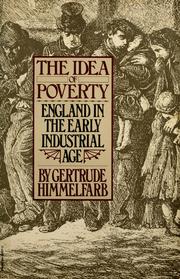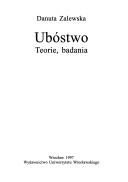| Listing 1 - 10 of 520 | << page >> |
Sort by
|
Book
ISBN: 9282618714 Year: 1990 Volume: vol *83
Abstract | Keywords | Export | Availability | Bookmark
 Loading...
Loading...Choose an application
- Reference Manager
- EndNote
- RefWorks (Direct export to RefWorks)
Poor --- Statistics --- -Disadvantaged, Economically --- Economically disadvantaged --- Impoverished people --- Low-income people --- Pauperism --- Poor, The --- Poor people --- Persons --- Social classes --- Poverty --- Economic conditions --- -Statistics --- Disadvantaged, Economically

ISBN: 0394410645 0394410653 Year: 1977 Publisher: New York, NY : Alfred A. Knopf,
Abstract | Keywords | Export | Availability | Bookmark
 Loading...
Loading...Choose an application
- Reference Manager
- EndNote
- RefWorks (Direct export to RefWorks)
Poor --- -Scholars --- -Persons --- Learning and scholarship --- Disadvantaged, Economically --- Economically disadvantaged --- Impoverished people --- Low-income people --- Pauperism --- Poor, The --- Poor people --- Persons --- Social classes --- Poverty --- Fiction --- Economic conditions --- Alabama --- Fiction. --- -Fiction --- -Disadvantaged, Economically

ISBN: 0394726073 Year: 1984 Publisher: London Vintage
Abstract | Keywords | Export | Availability | Bookmark
 Loading...
Loading...Choose an application
- Reference Manager
- EndNote
- RefWorks (Direct export to RefWorks)
History of the United Kingdom and Ireland --- anno 1700-1799 --- anno 1800-1899 --- -Poor --- -Disadvantaged, Economically --- Poor --- Disadvantaged, Economically --- Economically disadvantaged --- Impoverished people --- Low-income people --- Pauperism --- Poor, The --- Poor people --- Persons --- Social classes --- Poverty --- History --- Economic conditions --- Great Britain

ISBN: 832291640X Year: 1997 Volume: 1979 Publisher: Wroclaw Uniwersytet Wroclawski
Abstract | Keywords | Export | Availability | Bookmark
 Loading...
Loading...Choose an application
- Reference Manager
- EndNote
- RefWorks (Direct export to RefWorks)
Poverty --- Destitution --- Wealth --- Basic needs --- Begging --- Poor --- Subsistence economy --- Disadvantaged, Economically --- Economically disadvantaged --- Impoverished people --- Low-income people --- Pauperism --- Poor, The --- Poor people --- Persons --- Social classes --- Economic conditions
Book
ISBN: 0822978911 0822952904 1322183139 9780822978916 0822933713 9780822933717 9780822952909 Year: 1978 Publisher: Pittsburgh University of Pittsburgh Press
Abstract | Keywords | Export | Availability | Bookmark
 Loading...
Loading...Choose an application
- Reference Manager
- EndNote
- RefWorks (Direct export to RefWorks)
Includes Alaskan poems, p.42-51.
Poor --- Disadvantaged, Economically --- Economically disadvantaged --- Impoverished people --- Low-income people --- Pauperism --- Poor, The --- Poor people --- Economic conditions --- Persons --- Social classes --- Poverty --- United States --- American poetry

ISBN: 1136244727 0415863392 1315007088 1136244654 9781136244650 0415176328 9780415176323 9781315007083 9781136244728 9781136244797 9780415863391 Year: 1998 Volume: v. 14 Publisher: London Routledge
Abstract | Keywords | Export | Availability | Bookmark
 Loading...
Loading...Choose an application
- Reference Manager
- EndNote
- RefWorks (Direct export to RefWorks)
First published in 1998. Routledge is an imprint of Taylor & Francis, an informa company.
Slums --- Poor --- Disadvantaged, Economically --- Economically disadvantaged --- Impoverished people --- Low-income people --- Pauperism --- Poor, The --- Poor people --- Persons --- Social classes --- Poverty --- Slum clearance --- Housing --- Economic conditions
Book
ISBN: 1503603946 9781503603943 9780804799690 0804799695 1503608212 Year: 2018 Publisher: Stanford, California
Abstract | Keywords | Export | Availability | Bookmark
 Loading...
Loading...Choose an application
- Reference Manager
- EndNote
- RefWorks (Direct export to RefWorks)
Why are poor Americans so patriotic? They have significantly worse social benefits compared to other Western nations, and studies show that the American Dream of upward mobility is, for them, largely a myth. So why do these people love their country? Why have they not risen up to demand more from a system that is failing them? In Broke and Patriotic, Francesco Duina contends that the best way to answer these questions is to speak directly to America's most impoverished. Spending time in bus stations, Laundromats, senior citizen centers, homeless shelters, public libraries, and fast food restaurants, Duina conducted over sixty revealing interviews in which his participants explain how they view themselves and their country. He masterfully weaves their words into three narratives. First, America's poor still see their country as the "last hope" for themselves and the world: America offers its people a sense of dignity, closeness to God, and answers to most of humanity's problems. Second, America is still the "land of milk and honey:" a very rich and generous country where those who work hard can succeed. Third, America is the freest country on earth where self-determination is still possible. This book offers a stirring portrait of the people left behind by their country and left out of the national conversation. By giving them a voice, Duina sheds new light on a sector of American society that we are only beginning to recognize as a powerful force in shaping the country's future.
Patriotism --- Poor --- Disadvantaged, Economically --- Economically disadvantaged --- Impoverished people --- Low-income people --- Pauperism --- Poor, The --- Poor people --- Persons --- Social classes --- Poverty --- Attitudes. --- Economic conditions
Book
ISBN: 9780773556492 0773556494 9780773556485 0773556486 9780773556508 0773556508 9780773556515 0773556516 Year: 2019 Publisher: Montreal Kingston London Chicago
Abstract | Keywords | Export | Availability | Bookmark
 Loading...
Loading...Choose an application
- Reference Manager
- EndNote
- RefWorks (Direct export to RefWorks)
From the mid-eighteenth century to the early nineteenth century, the English Old Poor Law was waning, soon to be replaced by the New Poor Law and its dreaded workhouses. In Writing the Lives of the English Poor, 1750s-1830s Steven King reveals colourful stories of poor people, their advocates, and the officials with whom they engaged during this period in British history, distilled from the largest collection of parochial correspondence ever assembled. Investigating the way that people experienced and shaped the English and Welsh welfare system through the use of almost 26,000 pauper letters and the correspondence of overseers in forty-eight counties, Writing the Lives of the English Poor, 1750s-1830s reconstructs the process by which the poor claimed, extended, or defended their parochial allowances. Challenging preconceptions about literacy, power, social structure, and the agency of ordinary people, these stories suggest that advocates, officials, and the poor shared a common linguistic register and an understanding of how far welfare decisions could be contested and negotiated. King shifts attention away from traditional approaches to construct an unprecedented, comprehensive portrait of poor law administration and popular writing at the turn of the nineteenth century. At a time when the western European welfare model is under sustained threat, Writing the Lives of the English Poor, 1750s-1830s takes us back to its deepest roots to demonstrate that the signature of a strong welfare system is malleability.
Poor --- Disadvantaged, Economically --- Economically disadvantaged --- Impoverished people --- Low-income people --- Pauperism --- Poor, The --- Poor people --- Persons --- Social classes --- Poverty --- History --- Economic conditions
Book
ISBN: 9781622571260 1622571266 9781613245330 1613245335 Year: 2011 Publisher: Hauppauge, N.Y.
Abstract | Keywords | Export | Availability | Bookmark
 Loading...
Loading...Choose an application
- Reference Manager
- EndNote
- RefWorks (Direct export to RefWorks)
Malnutrition. --- Poor --- Disadvantaged, Economically --- Economically disadvantaged --- Impoverished people --- Low-income people --- Pauperism --- Poor, The --- Poor people --- Persons --- Social classes --- Poverty --- Nutrition disorders --- Nutrition --- Starvation --- Nutrition. --- Economic conditions
Book
ISBN: 0429752229 9780429423512 0429423519 9780429752223 9780429752230 0429752237 9780429752216 0429752210 9781138390119 9781032008790 Year: 2021 Publisher: Abingdon, Oxon ; New York, New York : Routledge,
Abstract | Keywords | Export | Availability | Bookmark
 Loading...
Loading...Choose an application
- Reference Manager
- EndNote
- RefWorks (Direct export to RefWorks)
"This book focuses on the Base of the Pyramid (BOP) in affluent countries and examines the challenge of how to address the needs of deprived population groups in wealthy societies. The BOP concept was originally developed for the situation of the bottom-tier of societies in developing and emerging countries. It presents an avenue for businesses and other organisations to develop opportunities and new business models that enable and empower those at the BOP. This book adapts BOP models to the context of affluent countries. BOP projects present also in affluent countries promising avenues for businesses, entrepreneurs, and civil society actors to become agents of change through value creation and business models that enable the BOP population to raise their socio-economic welfare and well-being. This book thus furthers our understanding of the characteristics of BOP markets and BOP initiatives in affluent countries, an area widely ignored by BOP scholars so far. It discusses challenges and opportunities of how to mitigate poverty and increase welfare in a sustainable manner while protecting vulnerable groups, and describes several instances of the lives of those affected. The different chapters employ a variety of theoretical and methodological approaches to lay a first foundation for BOP research in affluent countries. This book is recommended reading for managers and policy makers, as well as students and academics interested in the Base of the Pyramid"--
Poor --- Developed countries. --- Disadvantaged, Economically --- Economically disadvantaged --- Impoverished people --- Low-income people --- Pauperism --- Poor, The --- Poor people --- Persons --- Social classes --- Poverty --- Economic conditions
| Listing 1 - 10 of 520 | << page >> |
Sort by
|

 Search
Search Feedback
Feedback About UniCat
About UniCat  Help
Help News
News